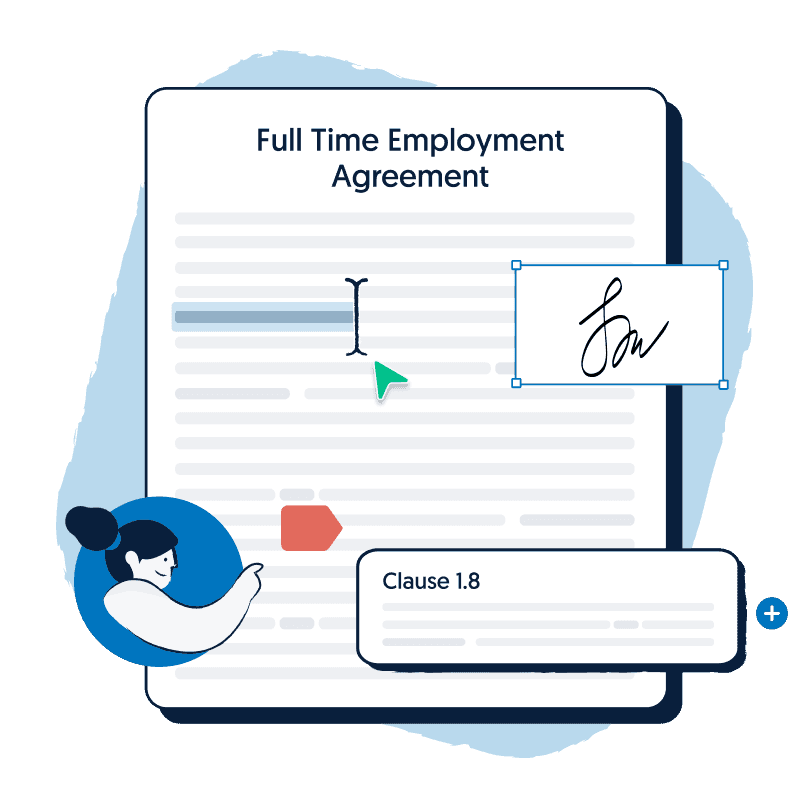Recognising what different protections exist for employees against unwarranted dismissals is vital regardless of what position you hold in the business. In particular, the differences between unfair dismissal actions and general protections.
While someone may feel that they have been wronged, it is important to pursue the correct action to achieve the best outcome.

Get your Full Time Employment Agreement legal document for free.
Unfair Dismissal
A claim of unfair dismissal is lodged with the Fair Work Commission (FWC). It may only be done if:
- The employee has been with the employer for at least six months, or twelve months in the case of a small business.
- It must be lodged within twenty-one days of the dismissal.
- The employee must earn less than the high-income threshold (currently $148,700 per year) or have a modern award that covers their employment.
Before it is brought to the FWC the employer and employee will meet to attempt to resolve the issue. Arbitration, led by a member of the FWC, will proceed if this fails.
In the unfair dismissal process, the onus lies with the employee (applicant). This means that they must prove that the dismissal was unfair. It is not presumed that the employer (respondent) was unfair, and it is not their job to prove they did nothing wrong.
Unfair dismissal factors
To determine whether the dismissal was unfair, the FWC will consider two key factors:
- Whether the termination had a valid reason.
- Whether the termination was harsh, unjust or unreasonable.
Beyond these, in specific cases, other factors may be relevant. For example, in cases of small business, whether the dismissal was in line with the Small Business Dismissal Code.
Valid reason
A valid reason will generally be one of poor performance, incapacity, breaches of policy or serious misconduct by the employee. The FWC will look at the employer’s reason within the context of the dismissal. Claims must also have evidence to support them.
Harsh, unjust or unreasonable
This is where the FWC consider all the factors surrounding the dismissal. Depending on the circumstance, one concept may be more relevant than the other two, or all three may overlap.
- Harsh: considers the severity of the decision in comparison to the alleged offence. It may also take into account the severity of the consequences to the individual personally, like the economic and social effects.
- Unjust: considers whether the dismissed person was guilty of the alleged offence.
- Unreasonable: considers whether the evidence presented by the employer supports the alleged offence.
On top of these, the surrounding circumstances will be considered. These include:
- Whether the employee warned of the problem. This depends on the situation.
- If the employee was warned, whether they were given an opportunity to fix the problem.
- Was the employee was notified of the reason for the dismissal?
- Depending on the size of the business, whether the employer utilised the appropriate levels of management or expertise throughout the termination process.
The FWC may also take into account any other factors it sees fit.
Unfair dismissal outcomes
Dependant on the outcome, the FWC may order for
- Reinstatement and compensation for lost wages.
- Compensation for lost wages capped at six months. This is based on either the employee’s actual wage or the annual high-income threshold, dependant on the situation.
General Protections
Unlike unfair dismissal, dismissal is not necessary to make a claim under general protections. These include things like treating you differently to other employees, not providing certain legal entitlements or even not hiring you.
If you feel an employer has breached any of these, you can immediately bring an action against them at court.
Like with unfair dismissal, disputes of dismissal require conference at the FWC first. If this fails, an action is then brought to the court.
These claims require no minimum employment term.
What is included in general protections?
Set out the in the Fair Work Act 2009 (Cth), general protections protect employees from employers acting ‘adversely’ (meaning they reacted badly) because of:
- Discriminatory factors, like race, sex, religion, age etc.
- Association with, membership and participation in unions.
- Absences from work for valid reasons. Such as illness, injury or parental leave.
- Complaints regarding their employment.
In these cases, onus again lies with the applicant to first prove that the adverse action was in response to a protected right. However, unlike unfair dismissal, the onus then reverses, and it is then up to the employer (respondent) to prove that this is not true.
General protection action outcomes
The same options are available to the court as with unfair dismissal. However, in addition, they may award compensation for:
- Uncapped compensation for economic loss.
- Non-economic loss, like humiliation or distress.
- Pecuniary penalties outline within the Fair Work Act 2009 (Cth).
Conclusion
While unfair dismissal and general protections may seem similar, they are two different processes.
Unfair dismissal protects against an unfairly harsh or unreasonable dismissal by your employer.
General protections protect your fundamental rights as an employee.
It is important that you recognise what action you may fall under.
Ultimately, if you feel that you have been unfairly dismissed it is best to first contact a lawyer to discuss your options.

Get a fixed-fee quote from Australia's largest lawyer marketplace.






